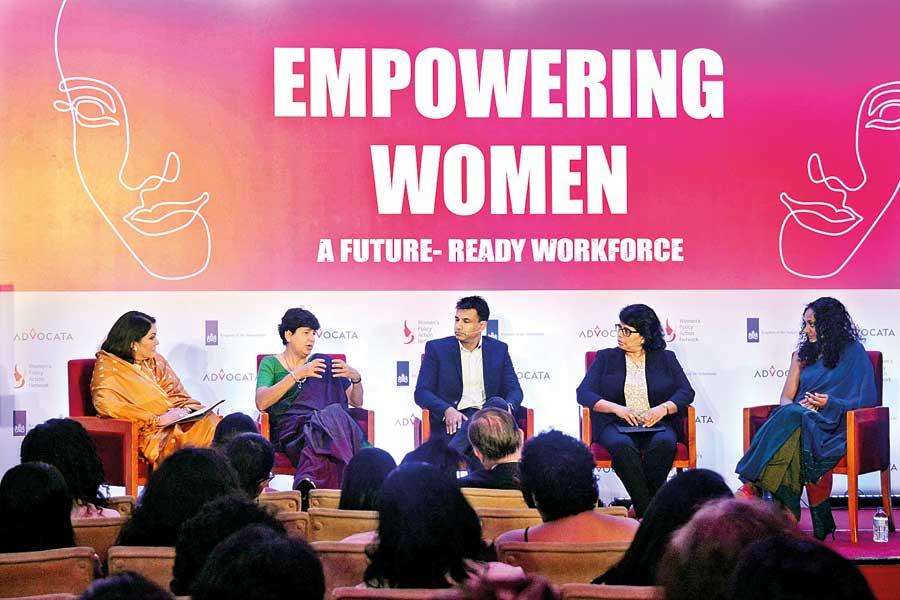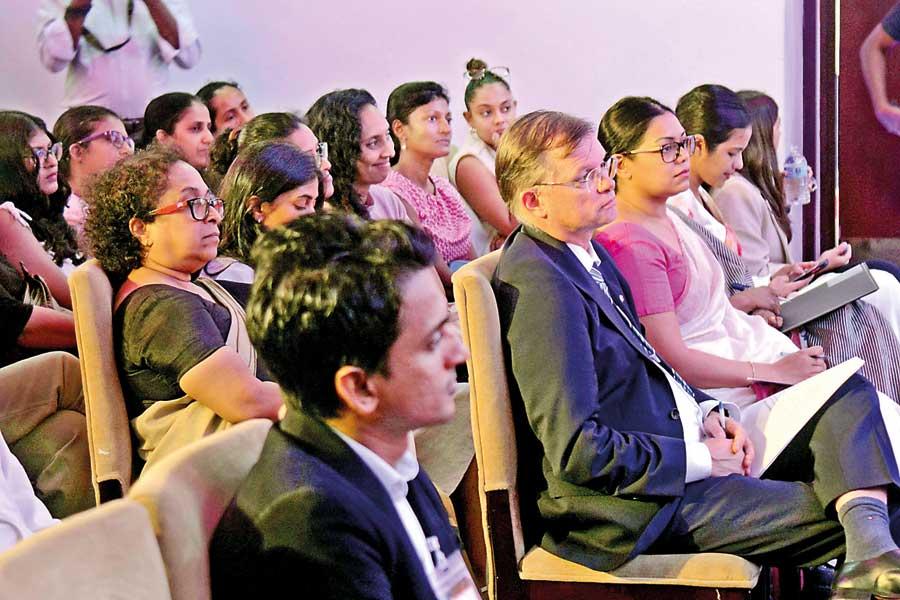Reply To:
Name - Reply Comment
In terms of elderly care services there are two main acts that protect elderly rights and wellbeing

Independent Consultant Dr Ramani Gunatilaka (Second from left) expressing her views at the panel discussion
Advocata institute held the ‘Women’s Policy Action Network’ conference which focused on the women empowerment in the country. The conference, held at the BMICH on August 29, focused on the two most solid problems; the unpaid care work burden and the lack of access to the digital economy.
empowerment in the country. The conference, held at the BMICH on August 29, focused on the two most solid problems; the unpaid care work burden and the lack of access to the digital economy.
The event commenced with the welcome speech by CEO Advocata Institute CEO Dhananath Fernando.
“We have a female driven organization. 85% of our team members are females. So I am very proud of that,” Fernando underscored this fact while welcoming the participants at the conference.
The gathering was then addressed by the Deputy of Head Mission Embassy of the Kingdom of the Netherlands to Sri Lanka and Maldives Iwan Rutjens.
“One of the chief aims is to strengthen the economic independence of women. This means getting more women into work and making it possible for men and women to share work and responsibilities more equally. Gender equality is the key to accelerate economic growth and any given scenario,” said Rutjens.
The event moved forward with the presentation presented by the Advocata Institute. The subject of the presentation was about the ‘Social Infrastructure for gender inequality and empowerment.’
Advocata Institute’s Research Manager Akhila Randeniya started the presentation by focusing on the Social infrastructure.
“As we all know 30% of Sri Lanka’s female labour force has been stagnated over the past couple of years. We focused on childcare, elderly care and parental leave. The issues that we found with childcare is the lack of affordability and access to frequent and quality child care. With regards to the elderly care Sri Lanka has an ageing population and with parental leave we have no mandated paternal leave and the employee currently bears the cost of maternity leave,” added Randeniya.
After that he shifted his attention to the childcare. He discussed the issues connected with the childcare.
“Primarily there are two issues we have found to be associated with childcare. First is the issue of accessibility and the second is the issue of regulation and monitoring. We recommend two things. First is that we would like to see more regulation and monitoring of child care centres. We would like to utilise local government mandates and have laws passed to standardise and regularlise day care centres. Secondly we also like to incentify the corporate sectors to open private day care centres and encourage this by utilising the existing infrastructure such as schools and daycare centers,” added Randeniya.
We have a female driven organization. 85% of our team members are females. So I am very proud of that
- Dhananath Fernando Advocata Institute CEO
Further issues of elderly care were discussed by the Advocata Institute’s Researcher Thathsarani Siriwardana.
“Sri Lanka is expected to face an ageing population by the year 2060. So this is a prediction made by the Asian Development Bank. As predicted by this bank the dependency ratio will nearly double,” warned Siriwardana.
She focused on the existing infrastructure for elderly care.
“For now, in Sri Lanka, there are around 225 elderly care centres. Out of those 220 are privately institutions. Which means only five of them are state run. Interestingly 60% of the elderly care centres in Sri Lanka are located in the Western Province. So what about the rest of the country? In Sabaragamuwa and Southern provinces the elderly population is much higher than in Western Province. In terms of elderly care services there are two main acts that protect elderly rights and wellbeing. The rights of elders’ Act was introduced in 2000. A new act for the protection of the rights of the elders’ was introduced in 2011. Apart from that in 2017 the National Elderly Health Policy of Sri Lanka was launched. Even though there are acts and policies their implementation and the effectiveness is somewhat limited due to the resource constraints the country is facing,” added Siriwardana.
Siriwardana made her presentation by focusing on the solutions for elderly care.

Advocata Institute's Research Assistant
Thathsarani Siriwardana
“The first thing is the elderly care sector should be regularised by the state. Secondly the state should increase their funding on more of the elderly care centres. As you can see the existing infrastructure comprises just five state run elderly care centres. Thirdly elderly care centres should be more accessible not only for the western province, but for the rest of the country too. Apart from that they should be more affordable and we must make sure that there quality service is provided,” added Siriwardana.
The moderator of the first panel Frontier Research’s Head of Applied Research Niroshi Perera drew the attention of participants towards the panel by starting off with the care burden borne by women. She invited Independent Consultant Dr. Ramani Gunatilaka to speak regarding this matter.
“I would say that the biggest impact of women’s participation in the workforce is the macroeconomic environment. If the economy isn’t generating a sufficient volume of work the other policies which are implemented can only have a marginal effect not only women, but men too.
As we all know 30% of Sri Lanka’s female labour force has been stagnated over the past couple of years. We focused on childcare, elderly care and parental leave
- Akhila Randeniya Advocata Institute Research Manager
And there is much analysis made on other nations like the western countries. The key factor in most western societies was the war. During World War 1 and the ‘second’ women were pulled into the work force. Then of course you got the economic growth going and the engine running and the women got employed. Care work is important and the issue of the elderly care work should become more and more important. We should try to address this issue,” added Gunatilaka.
The next question was asked from Former Mayor of Colombo Rosy Senananyake. The question was asked about what she thought of around child care.
“I think all care services should be universal and comprehensive which can address individual needs. However we also need to focus on the more marginalised and the vulnerable. I don’t think we don’t have enough policies regarding all forms of elderly care. Even though we have an act we need to regularize it,” added Senananyake.
Pix By Pradeep Pathirana

Advocata Institute's CEO Dhananath Fernando (left) and Deputy of Head Mission Embassy of the Kingdom of the Netherlands to Sri Lankaand Maldives Iwan Rutjens